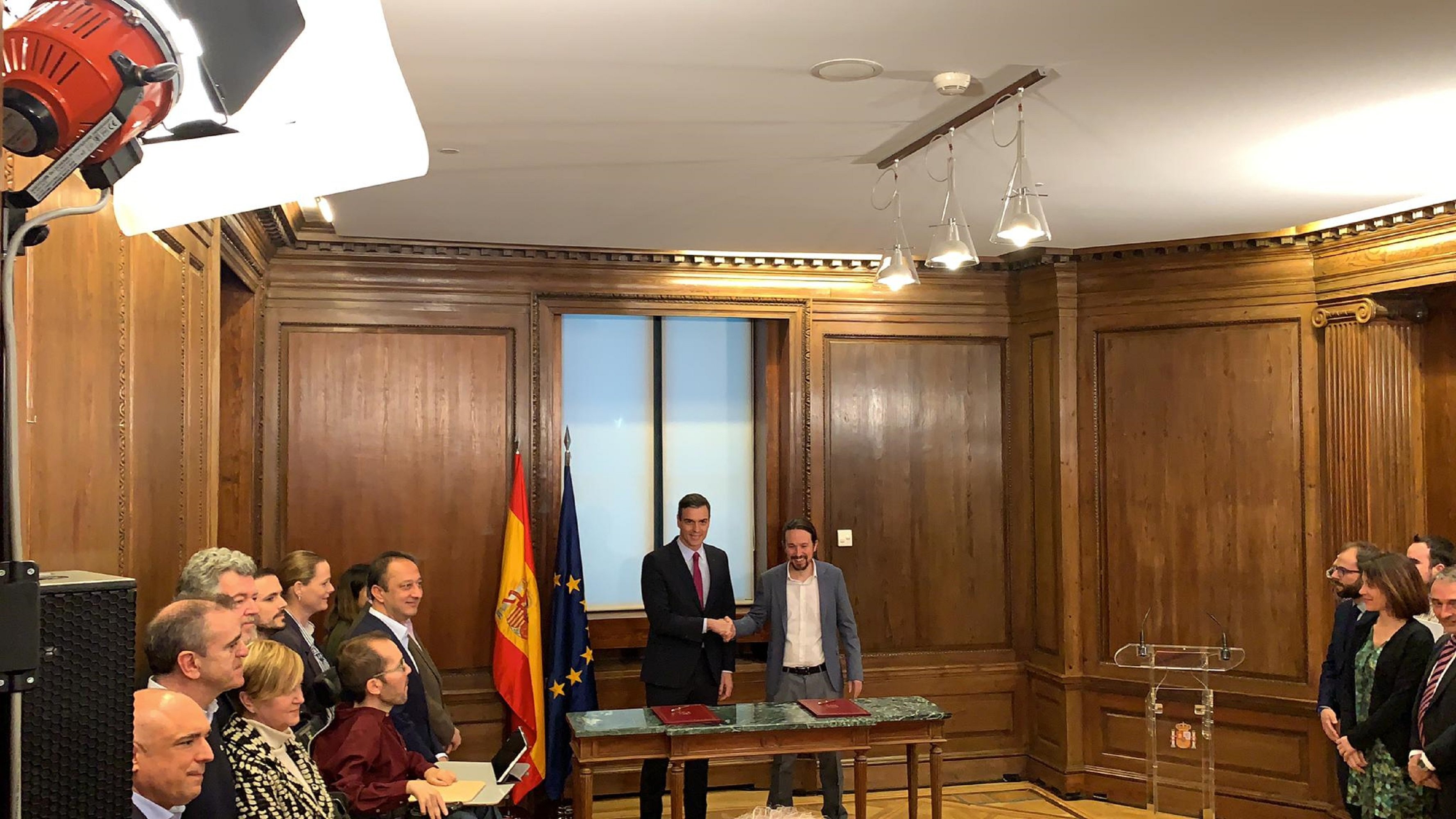The negotiation ended in the same way that it began: with Pedro Sánchez and Pablo Iglesias signing a document and hugging each other. On Monday afternoon, one and a half months after those first signatures, the PSOE and Unidas Podemos leaders signed the programmatic agreement on exactly what they want their new Spanish coalition government to be. The euphoria, however, was contained. All eyes were focusing on events 600 kilometres away: in Barcelona, at about the same time, ERC was starting its national executive meeting. On the table in front of the Catalan pro-independence party, the Spanish left's proposal for dialogue and the favourable report on the Junqueras question from the State Solicitors.
In statements to the media, prime ministerial candidate Sánchez admitted that governability will be "complex" due to the fragmentation in Spain's Congress of Deputies. However, he appealed for dialogue, and to the concept of social reform that his executive will be based on, to give political stability to Spain. "We will do this with a single gesture, the gesture of speaking," said Sánchez, who asserted the "territorial and ideological diversity" of Spain. The only two possible roads, he insisted, are those of "dialogue and accord". He called for the investiture of a government "sooner rather than later."
Pablo Iglesias, the first to speak, was more ambitious. He championed everything from the 15-M movement to the feminist movement in his assertion that the new coalition government will seek to turn the classic Podemos sí, se puede chant - "yes, we can" - into active policies of government". These movements, he continued, "arrived to tell us that things can be done in a different way." He affirmed that the new left-wing executive will begin an "historic era" for Spain, an era that will combine the "experience" of the PSOE and the "freshness" of Unidas Podemos.
Both leaders thanked the other for their "generosity" during the negotiation, which in their case ended well and this Monday has added the formal support of the Basque Nationalists, and the likely abstention of the other main Basque party, EH Bildu (if its rank and file agree). However, they are aware that the abstention of ERC is the make or break factor. That is why, despite the desire to invest a new government as soon as possible, both parties avoid getting cornered on specific dates for the investiture.
Catalonia in the programme
A total of seven lines out of the 49 pages in the coalition agreement document between the PSOE and Unidas Podemos are dedicated to talking specifically about Catalonia. Under the heading 'Progressivist Coalition - A New Accord for Spain', a chapter on territorial issues dedicates its ninth point to a commitment "to address the Catalan political conflict, promoting the political path through dialogue, negotiation and agreement between the parties to allow the current situation to be overcome." The coalition partners also commit themselves to "comply with Constitutional Court rulings and transfer to the Catalan government all competencies agreed in the Statute" - referring to powers that the Spanish state agreed to devolve under Catalonia's 2006 Statute of Autonomy but were never transferred, including university scholarships, specialized health education, maritime rescue and the execution of labour law.
Last key meeting at the Moncloa
The key date for the fumata bianca was yesterday: the programmatic agreement, which was presented in public on Monday, was completed at a meeting the Spanish government's Moncloa palace on Sunday. Attended by Pedro Sánchez and Félix Bolaños for the PSOE and Pablo Iglesias and Ione Belarra for Unidas Podemos. According to sources present at the meeting, "six or seven points" remained, to which the meeting was dedicated. Finally, on Monday, the accord was announced. Now it all awaits the all-clear from ERC.

